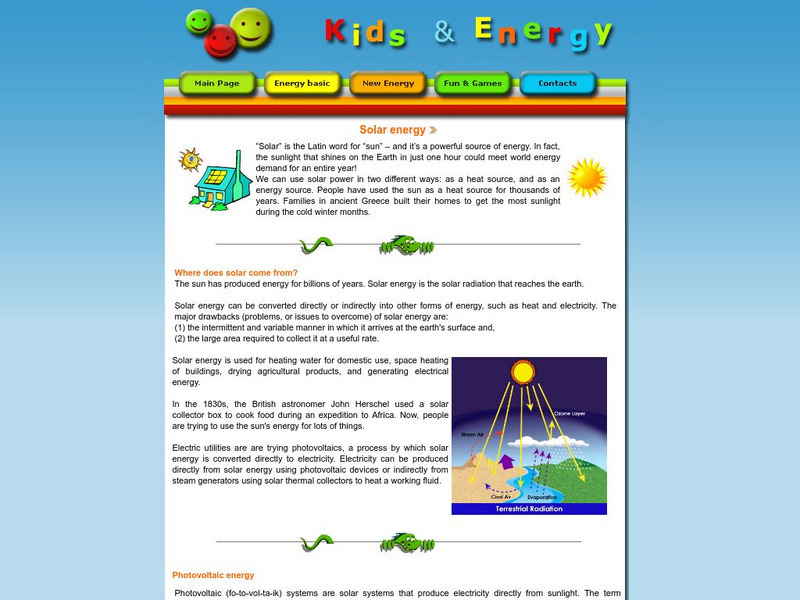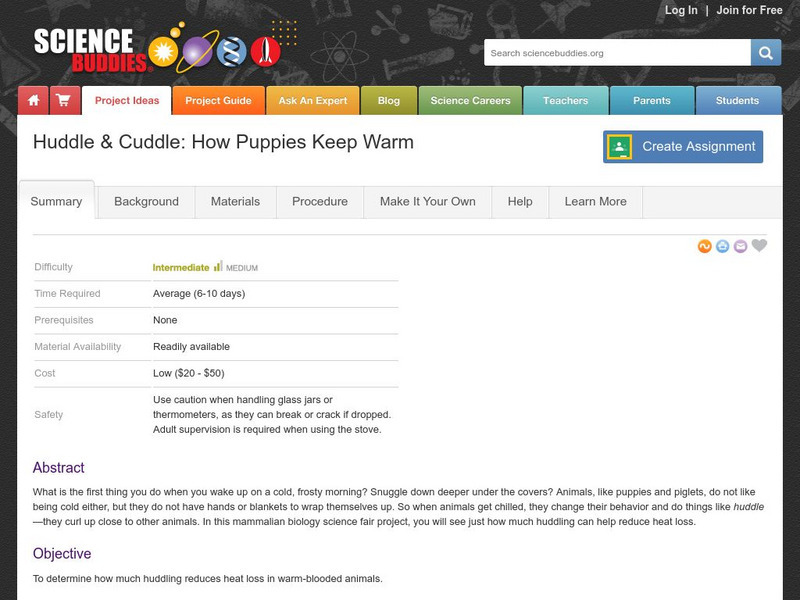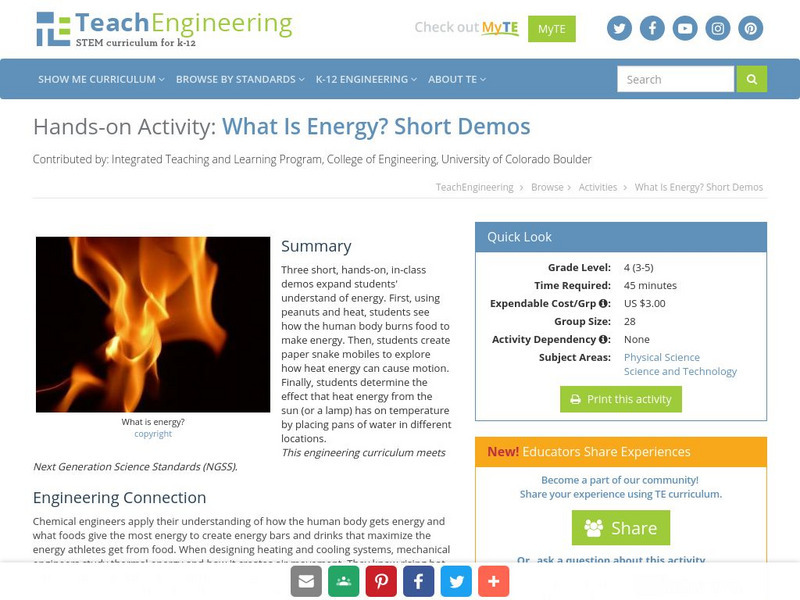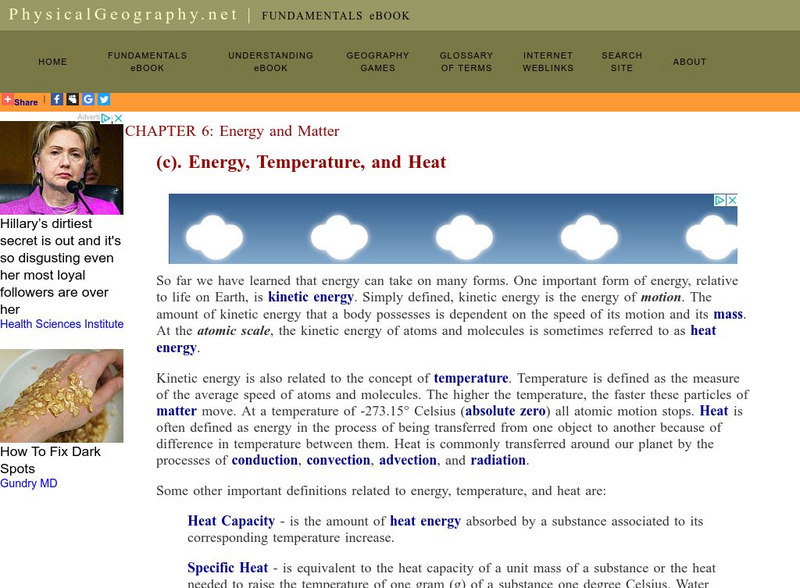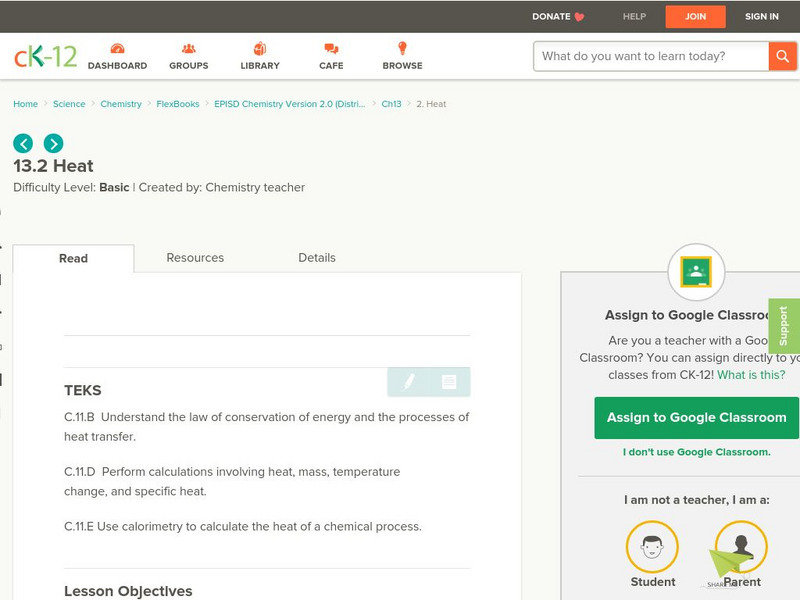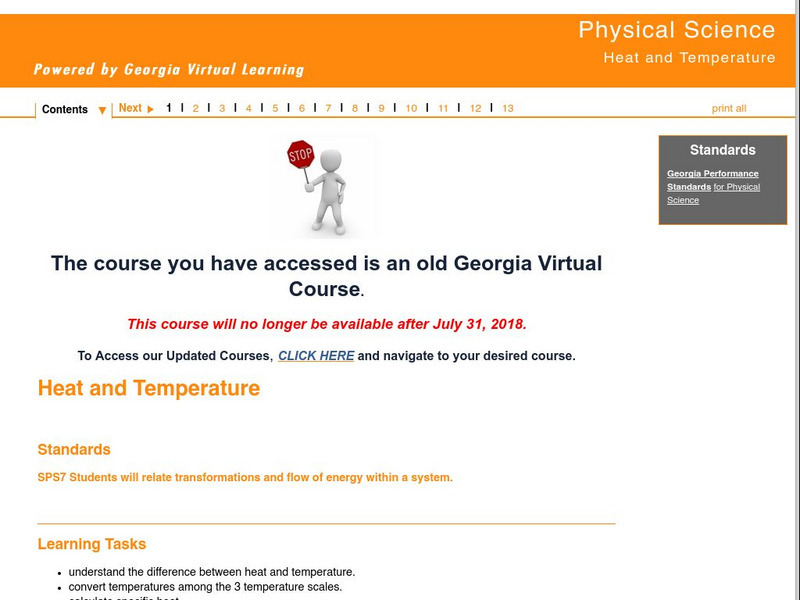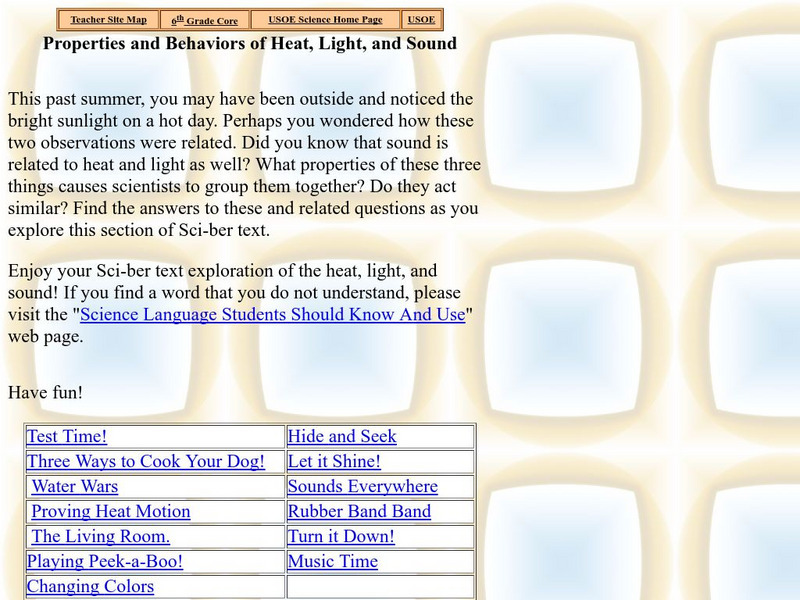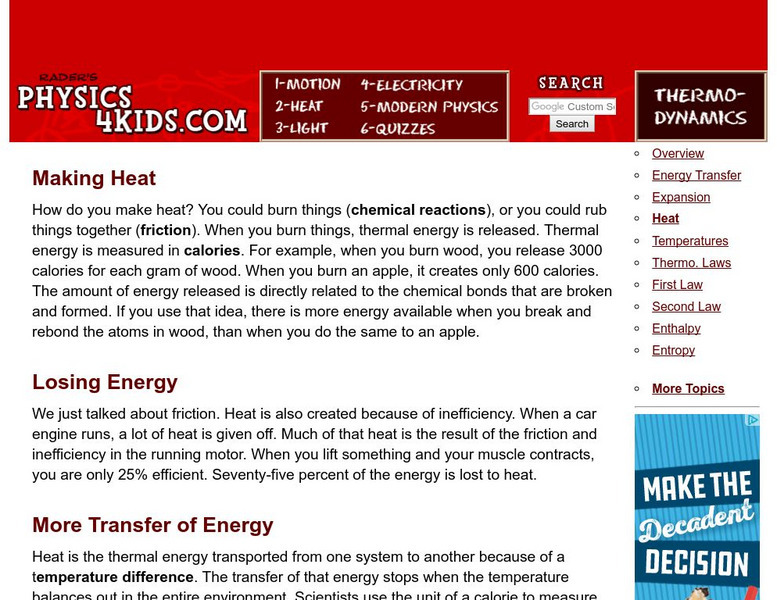CK-12 Foundation
Ck 12: Physics: Thermal Properties Study Guide
A study guide for concepts related to thermal energy.
CK-12 Foundation
Ck 12: Physical Science: Heat
[Free Registration/Login may be required to access all resource tools.] Definition of heat and how thermal energy is transferred.
FT Exploring
Ft Exploring: What Type of Energy Is It?
How many types of energy are there? Are there many forms of energy, such as electrical, mechanical, and chemical? Or are there really just two types of energy - kinetic energy and potential energy? Here you can learn about these...
University of Sydney (Australia)
Thermal Physics Module: Refrigerators and Heat Pumps [Pdf]
Refrigerators and heat pumps are described. Their operation is explained and the variables which improve their efficiency is discussed.
Energy for Sustainable Development
Esd Bulgaria: Kids & Energy: Solar Energy
Explains what solar energy is, how it differs from photovoltaic energy, and how it is harnessed to produce electric power for humans.
CK-12 Foundation
Ck 12: Heat Transfer
[Free Registration/Login may be required to access all resource tools.] Students explore the relationship between heat and energy transfer, and learn about the three ways that heat can be transferred between objects of different...
Other
U.s. Department of Energy: Photovoltaics
This site has an overview of PV technology, impact, system application and design. Information is provided on how to select the best solar system for various needs.
TeachEngineering
Teach Engineering: Heat Transfer: No Magic About It
Heat transfer is an important concept that is a part of everyday life yet often misunderstood by students. In this activity, students learn the scientific concepts of temperature, heat, and the transfer of heat through conduction,...
TeachEngineering
Teach Engineering: Conduction, Convection, and Radiation
With the help of simple, teacher-led demonstration activities, students learn the basic concepts of heat transfer by means of conduction, convection, and radiation. Students then apply these concepts as they work in teams to solve two...
Science Buddies
Science Buddies: Project Ideas: Huddle and Cuddle: How Puppies Keep Warm
In this mammalian biology science fair project, students will determine how much huddling reduces heat loss in warm-blooded animals. The Science Buddies project ideas are set up consistently beginning with an abstract, objective, and...
Georgia State University
Georgia State University: Hyper Physics: Thermal Expansion
Defines thermal expansion and elaborates on the concept of linear expansion. Provides the equation for linear expansion and includes an interactive JavaScript form which allows the visitor to investigate the relationship between...
State University of New York
State University of New York: Heat Transfer Between Substances
The following simulation assesses students understanding of thermal energy, transfer and equilibrium.
TeachEngineering
Teach Engineering: What Is Energy? Short Demos
Three short, hands-on, in-class demos expand students' understand of energy. First, using peanuts and heat, students see how the human body burns food to make energy. Then, students create paper snake mobiles to explore how heat energy...
Physics4kids
Physics 4 Kids: Heat and Thermal Energy
When scientists originally studied thermodynamics, they were really studying heat and thermal energy. Heat can do anything: move from one area to another, get atoms excited, and even increase energy. Did we say energy? That's what heat...
Other
Fund. Of Phys. Geography/energy, Temperature, and Heat
A page describing (in part) the distinction between energy, temperature and heat. Includes a graphic illustrating the quantity of energy needed to transform water between various states. Methods of thermal energy transfer (convection,...
Simon Fraser University
Chem1 Virtual Textbook: Energy, Heat, and Temperature
As part of a larger resource called "Getting started in Chemistry," this page examines various topics related to energy. The types of energy discussed include kinetic, potential, thermal, and chemical.
CK-12 Foundation
Ck 12: Heat
[Free Registration/Login may be required to access all resource tools.] Using the law of conservation of energy as a starting off point, students use the specific heat equation to perform calculations that relate mass, specific heat,...
University of Colorado
University of Colorado: Physics 2000: Bose Einstein Condensation: Temperature and Absolute Zero
From the Physics 2000 site, this page exemplifies their usual superb discussion of the concepts of heat, temperature, and absolute zero. Using an entertaining series of cartoon characters, the page gives a very understandable discussion...
State Energy Conservation Office-Texas
State Energy Conservation Office: Electricity From the Sun [Pdf]
Discusses forms of renewable energy that rely on the sun. For example, wind is created when solar energy heats the air, and biomass is solar energy that has been stored in plants.
Georgia Department of Education
Ga Virtual Learning: Physical Science: Heat and Temperature
With this learning module, students will understand the difference between heat and temperature, convert temperatures among different temperature scales, and calculate specific heat.
Utah State Office of Education
Utah Science: Properties and Behaviors of Heat, Light and Sound
How can scientists lump heat, light and sound together when investigating properties and behaviors? This learning module will address that question through a series of activities.
American Chemical Society
Middle School Chemistry: The Ups and Downs of Thermometers
Based on experimental observations, students describe, on the molecular level, why the liquid in a thermometer goes up when it is heated and down when it is cooled.
University of Sydney (Australia)
Thermal Physics Module: Thermal Expansion [Pdf]
A lengthy set of lecture notes on the topics of thermal expansion and heat absorption. The concept of specific heat capacity is explained and numerical examples are discussed. Heats of transformation (fusion, vaporization) are explained...
Physics4kids
Physics4 Kids: Thermodynamics and Heat: Heat
Explains how heat is created from a chemical reaction, from friction, or from energy inefficiency, as well as the meaning of specific heat capacity.



